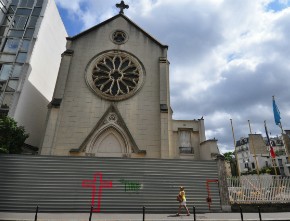Who owns France’s churches?

General Charles de Gaulle left a legacy of quotable remarks on many topics, and in recent years commentators have often returned to one on the subject of religion. In 1959, he denounced any suggestion of mass Arab immigration to France on the grounds that immigrant numbers would swamp the old-stock population. His ultimate nightmare was that his beloved village of Colombey-les-Deux-Églises (“Colombey of the Two Churches”) might degenerate into Colombey of the Two Mosques.
In recent years, the prospect of Islamization has become ever more terrifying for many French people. Future Islamist regimes in France have been described in various apocalyptic fantasies. However, the underlying issues have recently been dramatically highlighted in a quite sober news story.
Read our latest issue or browse back issues.
Dalil Boubakeur, rector of Paris’s Great Mosque, remarked that France had many thousands of churches, very few of which are used to any major extent, and many are effectively deserted. The number of French people who claim any Christian belief has declined precipitously, and only a small proportion of those believers actually attend services.
So, asked Boubakeur, why should some hundreds or even thousands of existing churches not be converted to mosques to serve the throngs of faithful Muslims who currently have no access to places of worship of their own? After all, he said, Christians and Muslims are ultimately in the same religious business, and both worship the same God; why should they not cooperate in a neighborly spirit?
Whatever we might think about the specific proposal, it offers an intriguing and quite fruitful thought experiment. The question might be applied equally well to other European countries where major churches have seen their numbers fall catastrophically. If old-stock Europeans have abandoned the churches, just why do those buildings still bear the “church” name, other than force of habit? At what point do they give up pretending?
In response, French observers have been forced to produce a number of counter-arguments, notably that the ancient churches serve more than a merely religious function. Intimately tied as they are to the country’s historical and cultural identity, they cannot simply be abandoned or handed over.
But that statement in turn invites new questions. If in fact authentic French identity and history are defined as Christian and Catholic, what message does that send to the country’s significant Muslim minority, notionally some 8 percent of the population? Must people of Muslim heritage always be doomed to outsider status, however peaceful and patriotic they might be, and even after five or ten generations have been born on French soil?
And if the churches are so fundamental to faith, culture, and national identity, why do so many millions of supposed Christians so reliably and consistently avoid those wonderful places each and every Sunday? The same questions might be asked of English Anglicans and German Protestants.
Actually, there are some other ways to answer Boubakeur’s searching question. For one thing, his approach greatly exaggerates the size of the country’s actively religious Muslim population.
When we say that France has 5 million Muslims, we are actually counting people whose families stem from countries where Islam is the default religion, regardless of whether as current French residents they practice any religion whatever. Many French people are Muslim only in the nominal sense that their neighbors are theoretically Catholic, and they would have little interest in a wave of new mosques. We should be cautious about accepting statistics from the official bodies that claim to speak for Europe’s Muslim communities, as they have such a powerful vested interest in exaggerating both the numbers and piety of their supposed followers.
Also, it is simply too early to write the obituary for French Christianity. Certainly, French rural churches are largely deserted, but cities often have thriving Catholic parishes. The problem is not that French Catholics have ceased to exist, but that they no longer live in the declining villages where the churches were once built in such profusion.
France is also home to some of the new ecclesial orders, which combine traditional Catholic ideas (pilgrimage and Marian devotion) with the energy and excitement of the charismatic renewal. However little they register on the radar of the obsessively secular French media, those devoted Christian groups and movements do exist. Their activities are mightily supplemented by newer immigrant Christians from Africa and Asia. If anyone should be claiming the title deeds of deserted ancient churches, then the newer Christians from the Congo, Vietnam, and Madagascar should probably be first in line.
Should Europe’s Christians help build new mosques to provide for Muslim believers? Certainly. But this is not a zero-sum game. Amazingly, both Christians and Muslims still have the capacity for future growth—even in Europe, even in France.






